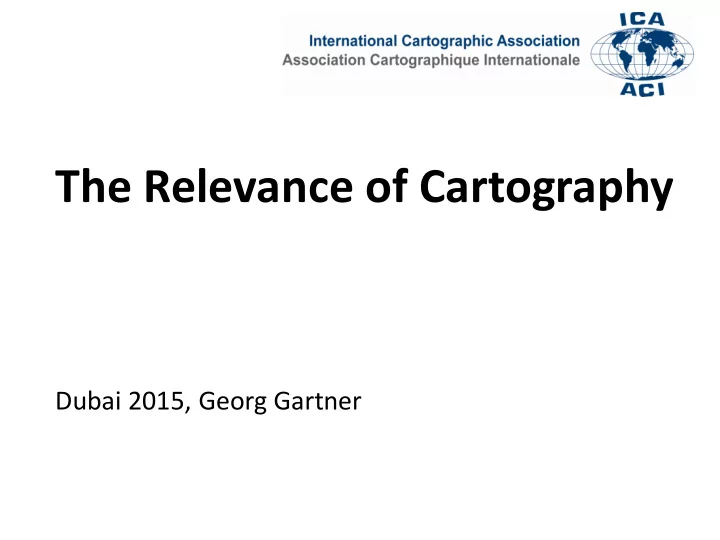

The Relevance of Cartography Dubai 2015, Georg Gartner
Where are we?
Data!
Data? We are not short of data
Technologies!
Technologies? We are not short of technologies
Data-driven and technology-driven approaches determine the use.
the particular need, demand, question, or problem of a human user is often taken into account only when the system has been built.
How can we unleash the potential of spatial information ?
How can we make sure that spatial data is really applicable for governments, for decision makers, for planners, for citizens through applications, products, and systems, which are not forcing them to adapt to the system but are easy to use and efficiently support the human user?
Maps and Cartography are key.
Think of a world without maps..
How would we answer space-related questions?
How would we support spatial behaviour?
How would we enable spatial thinking, reasoning, decision making, planning?
How would we enable spatial awareness?
Cartography? maps are perfect interfaces between geoinformation and human users
Cartography? maps are perfect interfaces between geoinformation and human users maps are efficient systems to structure and order information by spatial component
What Cartography is adding.. - to order
What Cartography is adding.. - to explore
Why maps are important - to express and to interact
What Cartography is adding.. - to entertain
What Cartography is adding.. - to make aware
Cartography? cartography is about efficient communication of spatial information by creation and use of maps anytime, anywhere
Implications cartography is about efficient communication of spatial information by creation and use of maps anytime, anywhere User! Abstraction! Design! Cognition!
Implications cartography is about efficient communication of spatial information by creation and use of maps anytime, anywhere Data handling and management! GI Science!
Implications cartography is about efficient communication of spatial information by creation and use of maps anytime, anywhere Service-oriented Cartography, NeoCartography, WebMapping, Mobile Mapping and LBS
Research Group Cartography Strategies - Research - Education - Organisations
Research creation and use of maps anytime, anywhere real-time ubiquitous media-adequate personalised well designed
Education International Masterprogramme „Cartography“ TU München, TU Wien, TU Dresden, Uni Twente
International Cartographic Association
International Cartographic Association Commissions Commission on Art and Cartography Commission on Atlases Commission on Cartography and Children Commission on Cartography in Early Warning and Crisis Management Commission on Cognitive Visualization Commission on Data Quality Commission on Digital Technologies in Cartographic Heritage Commission on Education and Training Commission on Generalisation and Multiple Representation Commission on Geoinformation Infrastructures and Standards Commission on Geospatial Analysis and Modeling Commission on Geovisualization Commission on GI for Sustainability Commission on the History of Cartography Commission on Map Design Commission on Map Production and Geo-Business Commission on Map Projections Commission on Mapping from Remote Sensor Imagery Commission on Maps and Graphics for Blind and Partially Sighted People Commission on Maps and Society Commission on Maps and the Internet Commission on Mountain Cartography Commission on Neocartography Commission on Open Source Geospatial Technologies Commission on Planetary Cartography Commission on Theoretical Cartography Commission on Ubiquitous Mapping Commission on Use and User Issues
International Cartographic Association Children Map Competition
International Cartographic Association Geo4All
International Cartographic Association International Map Year 2015
International Map Year 2015 The main purpose of the International Map Year (IMY), to be launched at the 28th International Cartographic Conference in Rio de Janeiro, is to expose the importance of maps and geographic information in human society.
What are the specific purposes of IMY? • make maps more visible to citizens in a global context • give all an opportunity to learn more about associated geospatial sciences • show how maps can be used in society • encourage all to experience how information technology can be used in acquiring and handling geographic information, and how it is possible to produce one’s own maps • demonstrate the necessity of a sustainable development of geographic information infrastructures.
International Cartographic Association International Cartographic Conference August 2015 Rio de Janeiro, Brasil
Recommend
More recommend